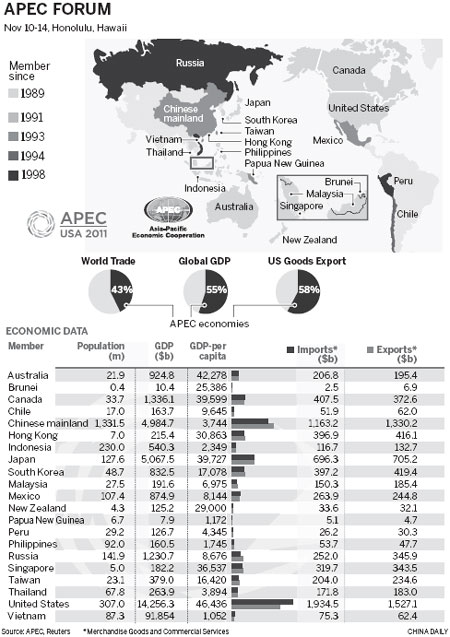US urged to respect diversity
Updated: 2011-11-08 08:02
By Wu Jiao (China Daily)
|
|||||||||
BEIJING - China said on Monday that the United States should respect the views of all member economies at the upcoming Asia-Pacific Economic Cooperation (APEC) forum in Hawaii.
The Foreign Ministry announced on Monday that President Hu Jintao will attend the 19th APEC Leaders' Meeting to be held in Hawaii from Nov 10 to 14.
Member economies have a positive attitude toward the key issues and proposals made by the US "on the whole", but some of Washington's expectations are "a little bit high", and "beyond the ability of the majority of the developing member economies", Assistant Foreign Minister Wu Hailong said at a news conference.
| ||||
Issues that the US will bring to the APEC meeting include green growth, innovation, regulatory cooperation and energy issues, Wu said, without elaborating.
The US, with advanced green technologies, said it hopes to persuade other Asia-Pacific economies to agree on a deal to remove barriers to trade in environmental goods and services.
In one case, the US has pledged to cut tariffs to a maximum 5 percent on a broad range of environmental goods and services by the end of 2012.
APEC economies are divided over what products and services should be covered.
Beyond renewable-power generation like solar and wind, the green products list could also include water-filtration technologies and energy-efficient products like fluorescent light bulbs, which generally have higher tariffs than average domestic industrial tariffs, the Wall Street Journal reported on Friday.
According to Assistant Minister of Commerce Yu Jianhua, the US produced a list of about 150 products categorized as "green products", with an average tariff of 1.4 percent.
But the average tariff on green products stands at less than 7 percent in China, Yu said at the same news conference.
Malaysia, for instance, imposes a 30 percent tariff on fluorescent bulbs, compared with an average tariff of 9 percent, according to World Bank data. Indonesia and the Philippines, also APEC members, maintain 15 percent tariffs on solar photovoltaic panels, of which China is the world's top exporter.
Developing economies also want a greater commitment from the US and other developed economies to technology transfers.
Yu added that any discussion at the APEC meeting should be in line with ongoing WTO negotiations.
APEC's 21 member economies now account for 43 percent of world trade and 55 percent of global economic activity, but as an open forum, the group's agreements, unlike those of the WTO, are non-binding.
"The US has been pressing for years to liberalize trade on green goods and services in World Trade Organization talks "with little success", the Wall Street Journal reported.
It said that US President Barack Obama's "efforts on the issue at the APEC face the same divisions that have stymied the WTO campaign".
Su Hao, director of the Asia-Pacific Research Center at China Foreign Affairs University in Beijing, said by pushing for the regional liberalization of green products and services, the US aims to deepen its trade advantages in the Pacific Rim, and make the developing economies more dependent on its high-end technology.
The Foreign Ministry also said that Hu will meet leaders from Japan, Peru, Vietnam and Canada on the sidelines of the APEC meeting, in addition to holding bilateral talks with Obama in his hometown.
China Daily













